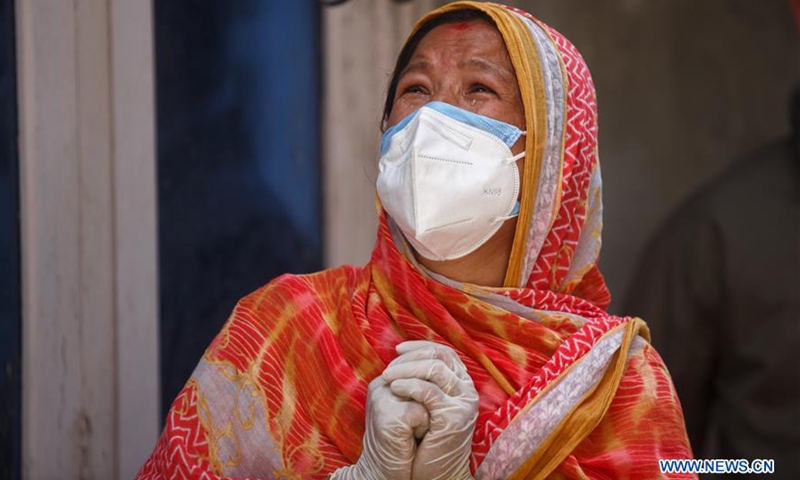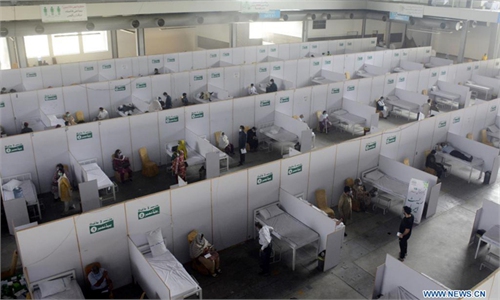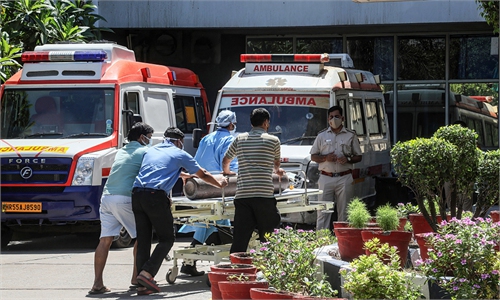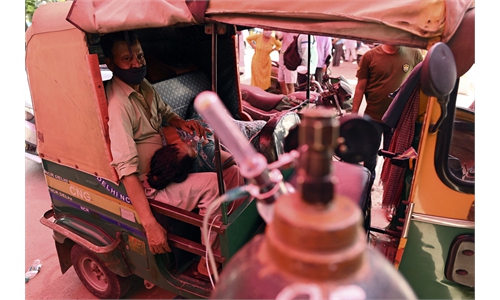Chinese Foreign Minister will meet counterparts from South Asian countries focusing on vaccine supplies and epidemic fight

A woman sheds tears as she mourns her family member who died of COVID-19 in Bhaktapur, Nepal, on August 30, 2020. Photo: Xinhua
Chinese State Councilor and Foreign Minister, Wang Yi, will meet with his counterparts from Afghanistan, Pakistan, Nepal, Sri Lanka and Bangladesh on Tuesday to discuss efforts to fight COVID-19 and post-pandemic economic recovery. Experts expect that vaccine cooperation will be a major topic given the grave situation in India.
The five countries already expressed their concerns about surging cases of COVID-19 in India in recent days as the South Asian nation recorded over 350,000 new daily cases for a fifth straight day on Monday.
In a recent tweet, the President of Afghanistan, Ashraf Ghani, sent condolences of the Afghan people to the families who lost a loved one, hoping for a quick recovery of those who are suffering from the virus in India. Pakistan has offered to provide aid to India such as ventilators, digital X-ray machines and PPE, according to media reports.
However, some neighboring countries like Nepal have suffered from the surging cases in India. Kathmandu has been grappling to contain the rapid rise of COVID-19 cases as thousands have caught the mutant virus strain first detected in India, Reuters reported on Monday.
"The major topics that would be discussed tomorrow may include cooperation in epidemic fight, border control measures, enhancing the medical treatment capability in South Asia and enhancing information sharing, while vaccine cooperation would be a major focus," Tian Guangqiang, Assistant Research Fellow at the National Institute of International Strategy of the Chinese Academy of Social Sciences, told the Global Times on Monday.
Tian added that China may step up efforts to help the region expand inoculation and probably will accelerate a mutual recognition mechanism for vaccines.
Those countries have also been relying on China for vaccine supplies and besides India, China plays a significant role in local mass vaccination campaigns. For instance, Nepal began vaccinations in January after receiving 1 million doses of the AstraZeneca/Oxford shot from neighboring India, according to local media India Today. Another 348,000 doses from the Covax initiative arrived in March.
But only half of the 2 million shots ordered from India have been delivered so far and none have been administered since mid-March, the report said.
However, Nepal announced in March that the vaccination drive would resume after 800,000 doses of China's Sinopharm vaccine arrived.
Also, 500,000 doses of Sinovac vaccines arrived in Pakistan, the Chinese Embassy in Islamabad announced on Monday. China will continue to support Pakistan's fight against the pandemic and will ensure vaccine supply.
Given the grave situation in India, it might need to change its export policies for vaccines, while some countries like Bangladesh, who rely on India for its vaccine supply, have been forced to abandon parts of their rollout, Tom Fowdy, a British analyst of political and international relations and graduate of Durham and Oxford universities, told the Global Times.
The interruption of vaccine supply also worried other South Asian countries as the region felt the impact of the coronavirus rampage in India. For urgent access to vaccines, the South Asian countries could seek support from China, which, as a responsible major power, reiterated its commitment to help others to fight the epidemic, according to experts.




